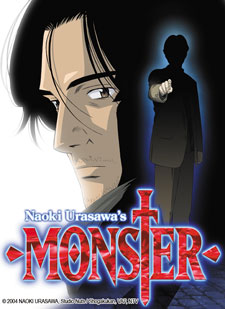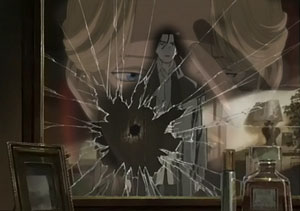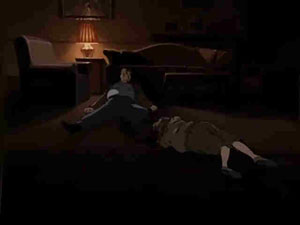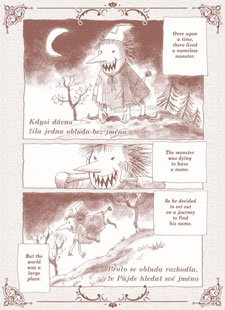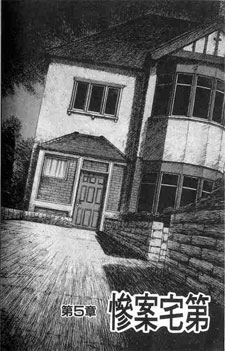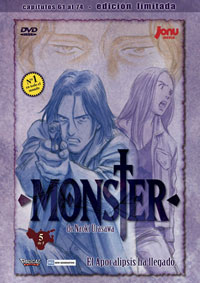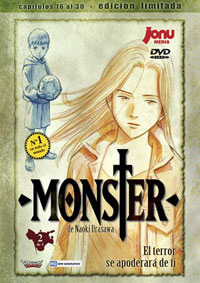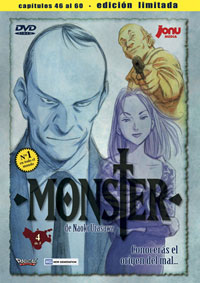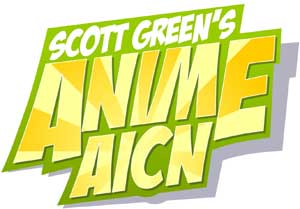 Logo handmade by Bannister
Column by Scott Green
Logo handmade by Bannister
Column by Scott Green
Anime fans will tell you that anime is not a medium limited to stories about ninjas, giant robots and girls with talking pets and magical lockets. And, it isn't. However, for every work that is artistically daring like Studio 4C's TekkonKinkreet, or intentionally distancing like Mamoru Oshii's Sky Crawlers, or allusive like Satoshi Kon's Paranoia Agent, there's a deluge of anime produced as a product - either safely appealing to an already interested audience, or following the directives of sponsors. When it comes to older audience works, there's a hell of a lot of bishojo, moe and other, 2D girlfriend bait, generated to draw in hard core anime devotees with little regard for anyone else. Considering the rise of late night anime and the programming blocks aimed at expanding audiences such as noitaminA, this has been a good decade for older anime fans. Yet, these days, a lot of what's out there would only appeal to otaku, and even then, I'm not sure how interesting most of it really is. As such, the anime suitable to recommend to an adult, non-fan or lapsed fan, are few and far between. Extrapolating that a bit, what anime could POSSIBLY be suitable for American prime time television? For years, the resounding answer forwarded by anime watchers has been Monster - a mature work that banked on the name of its creator (the popular in Japan and among English speaking manga readers Naoki Urasawa) rather than hooks that might alien non-anime fans - with few geek genre trappings - a Hitchcock meets Dickens serial populated by doctors, lawyers, psychiatrists, criminal psychologists - set in an explicitly Western context. And, after years of repeating "it'd be nice if Monster was on American TV," its happening...Starting Monday, October 12, 2009 morality suspense anime Monster will begin airing on the Syfy Ani-Monday block and will be re-broadcast on SyFy’s sister channel, Chiller the week thereafter. The 74 episode Madhouse (Paprika, the Girl Who Leapt Through Time, Ninja Scroll, Black Lagoon) production adapts Naoki Urasawa's award winning 18 volume manga series. (Newline was developing a live action version and as of 2005, A History of Violence's Josh Olson was reportedly writing the screenplay.) In 1986 a doctor commits a crime of humanitarianism. Seeking to redeem himself, the doctor saves a child who would grow up to become a Mephastophilisian demon. Many of the Urasawa's works are at least structurally comparable to recognizable popular media touch stones, and this is his Fugitive. Wrongfully suspected in the death of his hospital's director, and the serial killings of middle age couples, the Japanese, expatriate doctor travels through Germany and the Czech Republic, looking for the true killer - the brilliant young "Monster" known as Johan. Because this anime is not yet commercially available in North America (the first set of DVDs will be released 12/8) I have only seen the first few and last few episodes of the series, which confirmed everything I've heard about the anime, namely that it is remarkably faithful to the manga, which is compleatly available in English via Viz Media, and which I have read. The most important signifier for how a manga is intended to be read is the Japanese anthology that originally serialized that manga. A manga sporting the adventures of young kids, but published in Dengeki Daioh, is probably really for older teenage guys/young men trying to escape into cuteness and/or nostalgia and not written for readers the age of its subjects. Monster ran in Big Comic Original, part of manga giant Shogakukan's ( along with Shueisha, owner of Viz Media, publisher of Rumiko Takashi's frequent home, Shonen Sunday) seinen imprint. Original is distinguished from the initial Big Comic anthology by its publication schedule and the fact that its covers features animals rather than caricatures of famous personalities. In Dreamland Japan, Fredik L. Schodt says this of the manga's seinen demographic - "despite its youthful connotation, is a wonderfully vague term that can refer to males between the ages of fifteen and forty, but as the readership of manga ages, it is increasingly being abused." How about this for a gross, contradictable generalization? Young audience manga, like shonen, are about aspiration... I'll be the greatest ninja or pirate or go player or bread baker. Older audience manga, like seinen, are bout reconciliation... how do I live with my job, my family, my past, how do I get along with the world. Sure, the genre has works like Golgo 13, about a heartless trouble shooter capable of besting any obstacle, but many of its characters have to deal with the place into which they've put themselves. That's certainly the case with Monster, which presents its central dilemma in one of the strongest opening volumes to a long running serial manga. Monster opens in 1986, Dusseldorf, West Germany. Dr. Kenzo Tenma left Japan to escape from under the shadow of his father and the elder brother due to inherit the family practice. It's perhaps not coincidental that this character shares a name with the tormented creator of Astro Boy's titular robot child. Medical operations in Monster are reminiscent of ones in Tezuka manga like his stories of rogue surgeon Black Jack. Urasawa would go on to retell one of Astro Boy's most famous stories in Pluto, and he borrows from the God of Manga's storytelling toolkit in works like Monster. Despite the less than auspicious reasons for relocating to Germany and challenges to come, Tenma quickly established himself as a brilliant student and lauded neurosurgeon. Coming off the high profile resuscitation of a famous opera singer, engaged to the daughter of his prestigious hospital's director and on the fast track with the institutional politics, Tenma was in a happy daze when a weeping woman accused him of being responsible for her husband's death. She calls attention to what Tenma should have recognized. Her husband, a Turkish immigrant laborer, was brought into the hospital before the opera singer. Tenma was due to begin operating on the woman's husband, but was called off on the directors orders to begin work on the more prominent patient. As he discusses the matter with his fiancé, Eva over dinner at a fine restaurant, he finds that she’s far less concerned about the matter than she is in prestige. With complete sincerity, she lets him know that she believes that not all human lives are equal. By the same token, her father, who has been using Tenma to ghostwrite theses, tells Tenma that the true function of hospitals is their academic works - that the broad goal of advancing the science of medicine trumps the narrow distractions of individual lives. It is not long before Tenma is forced to act on the moral conundrum weighing on him. He's called into the hospital. The news of the day has been the arrival of an East German trade advisor who defected with his wife and twin children. That night, the man and his wife had been found dead. The twin girl was in a severely traumatized state and the boy was shot in the skull, but living. Tenma was preparing to operate when the head of surgery called him aside. The city's mayor collapsed from cerebral thrombosis. The head of surgery and director order Tenma to leave the boy to others and attend the mayor. Tenma insisted that others lacked the skill needed save boy, but director the countered with the detail that the mayor had agreed to increase the hospital's funding. Tenma left the other doctors scheduled to accompany him on the mayor's surgery and returned to the boy. The boy lived. The mayor died. The incident leaves Tenma with a reputation for betraying his team and the hospital. Eva dumps him. His once-to-be father in law lets Tenma know that he's stuck. He should give up all hopes of advancing. The hospital will neither approve future academic work nor write Tenma a letter of introduction should he seek a transfer. The one voice of consolation he receives is from a veteran at the bottom rung of the hospital hierarchy. "Promotions aren't everything. Just being a doctor makes you popular with the ladies." Tenma visits the comatose boy in the ICU and shares his woes with the child. He insists that he did nothing wrong, begins raging and proclaims that the money loving director should be dead. Calming down, he thanks the child for awakening his responsibilities as a doctor. He notes that he lost everything to keep the child alive, and tells the boy to hang on. The boy wakes up as the hospital higher ups begin toying with the children, hoping to set the loss of their mayoral ally with some publicity. Then, on a night that the twins disappear, the director, head of surgery and one of the top surgeons are found poisoned. In the ensuing chaos, Tenma's career path is rectified. The hospital board names him head of surgery. Eva tries to take him back, a proposition that Tenma rejects. Except that the dogged BKA (German federal police) Investigator Lunge (voiced by Richard Epcar - Ghost in the Shell's Batou, Ninja Scroll's Gemma, Robotech's Ben Dixon) suspects him in the murder of the poison victims, Tenma is able to go about his life unencumbered by these events. Time passes, and in 1995 childless middle aged couples begin turning up murdered. Break-in artist Adolf Junkers is believed to be connected to the case. After being hit by a car, Junkers is brought to Tenma's hospital. While attending the man, Junkers becomes startled and alerts Tenma "the Monster is coming..." Junkers runs off and Tenma pursues, catching up in an abandoned factory. A young man, identified as "Johan” immerges from the shadows, and executes Junkers. Johan informs Tenma that the moniker isn't his real name, and that he's about the business of erasing his past. That the hospital director and head of surgery were killed because Tenma wanted them dead and killing them would repay Johan's debt. And, that Johan would not be alive if it wasn't for Tenma's intervention. With Junkers dead and no Johan to be found, Lunge comes to suspect that Tenma murdered Junkers and was the serial killer, with "Johan" existing as a split personality in Tenma's mind. Monster joins a compelling antagonist with an equally compelling conundrum. With numerous comparisons between Johan and the dictator Urasawa invites the "would you kill Hitler as a child" thought experiment. Most notably, Neo-Nazis seek to induct Johan into a leadership position or groom their alternate. In some regards they are on the right track. Johan's charisma and his strategic thinking do affirm their reckonings. However, the ways in which they are incorrect speak to the nature of Monster. Monster does evoke religion, particularly in apocalyptic visions. And, it does evoke politics, particularly the cold war split and the social engineering efforts of the Eastern Block. Yet, it neither obeys nor debates these frameworks. Johan and Tenma are fit into the roles of polar opposites, but not because Johan is the child of some Zoroastrian force of darkness. There is evidence enough to suspect that either the mayor or Johan would have survived due to Tenma's actions. It's not some Rosemary’s Baby/Omen/Left Behind Antichrist or conqueror of nations that Tenma unleashed upon the world. Instead, Johan's more comparable to a psychological virus. The story relates how young Johan was fascinated by fear. A World War II veteran tells Tenma how 12 year old Johan implored him to tell him about the experience of being trapped in a crippled U-boat for 36 hours. With this insight into how people process various stimuli Johan uses his skill at fingering emotional wounds and widening mental fracture points to open gaps sufficient to grab hold of his target's mind. He herds predators, directing the actions of serial killers to accomplish his goals. Nuisances, less useful acquaintances and other unfortunates are infected and consumed by thanatosis or guided towards unfortunate accidents. If Johan is the vector for an infectious psychological disease, Tenma is the antibody. The contradiction between two certainties torment Tenma... that human life must be preserved, and that by saving Johan, he is responsible for allowing a grave threat to life to be endanger more lives. The consequences of Tenma's actions violate the values that spurred those actions. Here's my mature manga theory in action: an adult protagonist with an established life suffering for and hopefully correcting what they've done. Taking ownership of the duty to stop Johan, Tenma commits to the tireless effort and suffers for his dedication. With Lunge hounding him, the efforts of unraveling Johan's past and blocking his plans transform the confident young surgeon into a gaunt, disheveled figure, unable to eat or sleep. The nature of the threat posed by Johan reflects the nature of Monster: a psychological thriller, that operates on the mental mechanics of its characters. By the same token, the trajectory of Tenma's journey to reflects the structure of the manga. Monster isn't a short manga. And with 74 episodes, it isn't a short anime series. In many manga, creators would erect a story arc to cover that span. It might, be convoluted. There would probably be digressions and padding (often referred to as filler) but it could be categorized by that "arc" shaped trajectory. Monster is more an odyssey than an arc. Tenma hunts Johan and is hunted by Lunge, but once the manga departs from that first volume, it's all encounters, down to its conclusive situation and even its post script. Johan meets people and positions/poisoned them based on his history and their history. Tenma meets people, and positions/heals them. There are significant stretches of the manga in which Tenma is absent, at which times it is his confidantes or even in some cases confidantes of confidantes who advance the story. The effecting irony of this is that while Tenma is driven to stop the root vector of this crisis, namely Johan, most of the good that he does is collateral; in small or in great ways helping the people that he encounters. Saying that Monster is an odyssey rather than an arc may sound like the story is all middle. That's not an entirely untrue impression. While evidentially plotted out, Monster travels until it exhausts itself and hits its destination. Urasawa isn't a play writer or a screen writer. He's creating a manga series published in a twice-monthly anthology. Even his relatively short Pluto, which retells a one volume Astro Boy story, is not modeled after the three act structure. Instead, Urasawa tailors his manga towards that serialized format. Chapters are brilliantly related episodes in the lives of Monsters protagonists, antagonists and the people with which they interact - the ex-mercenary who teaches Tenma how to handle a gun, the war veteran watching birds in the forest from which Tenma tormentedly considers sniping Johan, the ward of the state guided by Johan into the red light district to find his mother, the corrupted cop who becomes a marked man after undertaking a job for Johan. While those characters leave impressions with their brief interactions, others have longer runs in the manga, told over a volume or longer depending on how deeply they become entangled into the chase and how long they survive - for example, the slouching ex-con hired to mind Eva, the elderly industrialist no longer able or inclined to live up to his monstrous reputation, or the lanky spy with a fearsome, blackout rages and a history that parallel's Johan's who never the less labors to shade light on past crimes. There are a couple of things to note here. First, Monster features an abundance of characters who can be described as an "ex-" something or other, often consciously or subconsciously looking to correct past mistakes. The net is that these characters rarely escape their pasts by changing their careers or functions. This is something that Johan understands and exploits; that sometimes what a person might believe to be a cause for their decisions and woes is actually a symptom. And, it's something that Tenma helps the encountered people to reconcile. Monster paves its way with moving stories of these lives that are fixed, shattered or both, sometimes compacted into an episodic space and sometimes strung into longer stage of the journey. Urasawa invents enough of these stories of attempted redemption, and makes them sufficiently involving that Monster never loses its impact over its long journey. Second, the assorted ex's in which Monster trades are generally stock characters. The slovenly journalist too absorbed in the work, the weaselly thief, the local drunk. These aren't newly minted types, nor does Urasawa expect them to be mistaken for originals. He seems to given a nod towards Osamu Tezuka's "Star System" of reusable character templates with a personality who is more or less an instance of the large, gruff Shunsaku Ban ("Mr. Mustachio" in Astro Boy). Nor is Urasawa above stock overtures. A scene of a ward full of hospital patients moving their wheel chairs to block Lunge's pursuit of Tenma is not only familiar, it has the potential to nauseatingly trite. However, it's saved by a core of genuine credibility. During an extensive interview for the profile show Professional, one of Urasawa's catch phrases that was picked out and repeated on title cards was that "humans are not simple." Monster is thoroughly a genre story, populated by obviously fictional character. However, subtleties in their design and expression, along with tangible details concerning how they approach the world make them believable. The mechanics of Monster turn on involving characters, whose personal stories are used to provoke. Creator Naoki Urasawa will often provide story answers to the questions raised about the characters, but just as often, leave the complete implications open. With an added sense of danger, engaging in this way he builds a deeply engrossing, taut thriller, full of moments and characters that are unforgettable. Regardless of your general impression of the medium, this is a series not to miss.

